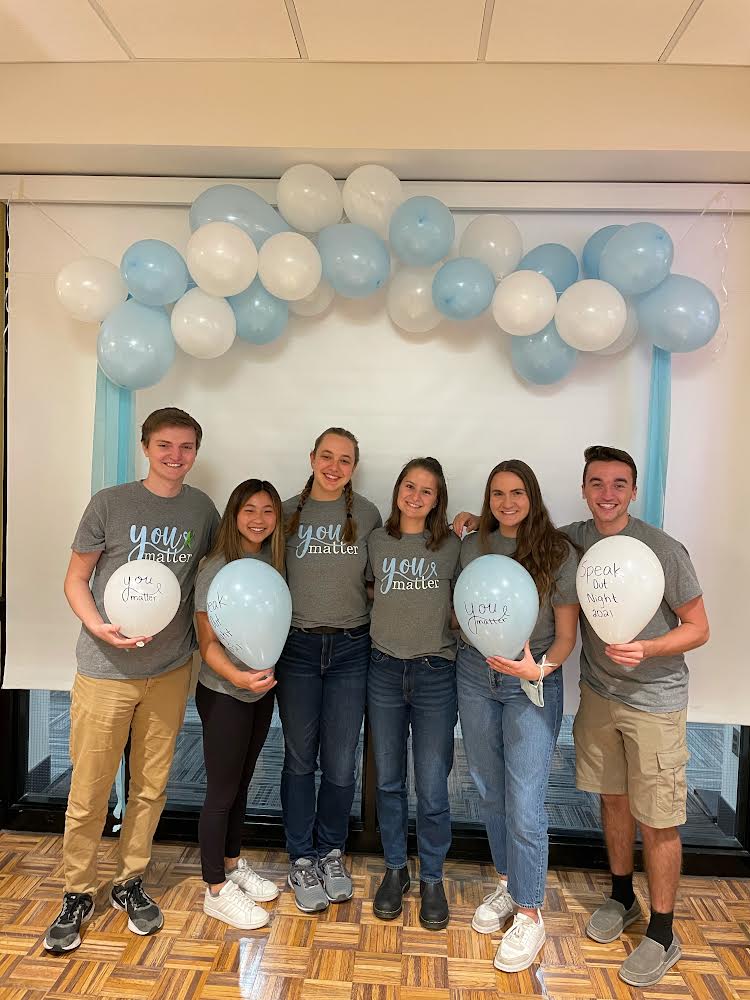Image: The YOUMatter officers posed for a photo at the club’s Speak Out Night in fall 2021. The event is designed to encourage students to stand up and share their experiences with mental health. (Courtesy of Sydney Swenson)
The student group encourages conversation, education and support for mental health conditions beyond simply reducing stress.
By Macy Harder
When fourth-year student Sydney Swenson was growing up, mental health wasn’t a frequent topic of conversation in her hometown of Kaukauna, Wisconsin. As a result, she spent most of her early years unaware that she was dealing with anxiety and depression.
“I just kind of thought everybody felt like that,” Swenson said.
It wasn’t until she was in high school that Swenson started learning about mental health and understanding her own experience. By the time she came to the University of Minnesota, she had decided that she wanted to be around a community that values having conversations about these issues. That’s when she discovered the student group YOUMatter, where she currently serves as president.
YOUMatter aims to end the negative stigma surrounding mental health through a mix of self-care and educational opportunities for students. The group focuses on building a supportive community to foster conversations about living with diagnosed mental health challenges such as bipolar disorder, eating disorders, obsessive compulsive disorder, depression or panic disorders.
Students seeking mental health care on campus often find a handful of resources largely devoted to stress management. Swenson said this approach is simply not enough for students facing such disorders.
“It’s more than stress,” Swenson said about a diagnosed mental health condition a student might face. “Every student deals with stress, but if you’re only going to try to use de-stressing tools to understand mental health, that’s not the whole story. YOUMatter is unique in the sense that it offers a more specific perspective that it’s not just stress. It’s an illness.”
When it was created on the Twin Cities campus in 2016, YOUMatter filled a need that the University had not yet addressed: a community of peers who understood the experience of living with mental health diagnoses.
“Most of our members either have a diagnosed mental illness or have seen the true effects of mental illness on the lives of people around them,” Swenson said. “YOUMatter offers a really open-minded and understanding community that validates each other instead of trying to fix each other.”
The student group builds this sense of community through interactive meetings and events, she said. In the past, they’ve offered painting activities, meditation, mindfulness sessions and social outings to promote group bonding. “It’s a way to get out of your head and realize it’s OK to take a break for a few hours,” Swenson said.
Eidan Silver, an officer and events coordinator for YOUMatter, said community building often makes people feel more comfortable sharing their experiences.
“Our goal really is to focus on creating a safe space and real relationships with people,” he said. “It doesn’t feel like a club, it feels like a friend group. But it’s a friend group with a little bit of an ulterior motive, which is to get people to open up about mental health.”
One event that encourages these conversations is Speak Out Night, which YOUMatter holds every fall. Silver explained that the premise is to get students to stand up and talk about their mental health journey. In addition, the event usually features guest speakers from the National Alliance on Mental Illness (NAMI). The club also holds educational events throughout the semester, including speakers from NAMI and elsewhere who have discussed topics such as mental health during the pandemic, addiction or building caring communities around mental health.
Today, YOUMatter is a nonprofit organization focused on mental health advocacy for college students and has chapters at the University of Minnesota’s Duluth campus and at the University of North Dakota.
As for the future of YOUMatter on the Twin Cities campus, Swenson said she hopes to get involved in more University policy and community initiatives. Later this semester, the club plans to make care kits or blankets for a local mental health facility, she said. The main goal is to continue supporting students with mental health diagnoses and to do so with knowledge and care.
“Our group just wants to offer a safe and supportive environment where people are dealing with similar things as you, and are there to help you learn how to take care of yourself and others,” Swenson said.
